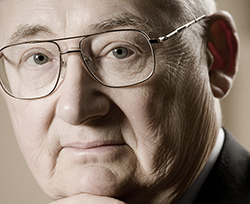Sider to "The Healing Touch"
Brooke's greatest stand

A retired Army colonel standing 6 feet, 5 inches tall, School of Allied Health Sciences
Dean Paul Brooke, Jr., Ph.D., can seem a little formidable. But one handshake and
a sincere welcome later and it is no wonder Brooke’s staff love him, and that his
students are leaders in the academic arena of what he calls “the service end of medicine.”
Brooke is genuine in his love for the school, and he’s proud of the growth they’ve
achieved over the course of the past 25 years since its inception. Yet, he’s humble
when admitting the majority of it has happened during his tenure at the helm.
Initially offering only undergraduate degrees, the School of Allied Health Sciences
now offers 15 programs within its four separate academic departments: laboratory sciences
and primary care, speech, language and hearing sciences, rehabilitation sciences,
and clinic administration and rehabilitation counseling. In addition to undergraduate-level
programs, the school offers graduate degrees in seven master’s and four
doctoral programs.
“Bottom line: We’ve doubled our enrollment and tripled our degree programs,” Brooke
explains. “Why? Because we could.”
Matter of fact? Yes. But that is Brooke. Then spills the genuine care he has for what
his students study, for their accomplishments and for the people in West Texas to
have the very best care from his graduates.
“Our goal has been to increase academic opportunities for the people of West Texas
by offering quality education that meets our geographical demands,” he explained.
“And, ultimately, to turn out graduates who may choose to stay in this area and contribute
to the quality of health and life in West Texas.”
While Brooke says his graduates are sought for jobs across the United States, more
than 90 percent choose to stay in Texas – many in West Texas. And that’s just fine
with him.
“We’ve been pioneers in a number of programs, from offering the first Doctor of Audiology
program west of the Mississippi, to having the first Master of Science in Molecular
Pathology in the country,” he said. “But directly affecting the quality of life and
living in West Texas – whether it be for the students seeking an education or the
lives they touch after graduation – I’m glad it’s all happening right here.”
Related Stories
Celebrating Veterans: TTUHSC’s General Martin Clay’s Legacy of Service and Leadership
From his initial enlistment in the Army National Guard 36 years ago to his leadership in military and civilian health care management roles, Major General Martin Clay’s career has been shaped by adaptability, mission focus and service to others.
Texas Tech University Health Sciences Center School of Nursing Named Best Accelerated Bachelor of Science in Nursing Program in Texas
The TTUHSC School of Nursing Accelerated Bachelor of Science in Nursing (BSN) program has been ranked the No. 1 accelerated nursing program in Texas by RegisteredNursing.org.
TTUHSC Names New Regional Dean for the School of Nursing
Louise Rice, DNP, RN, has been named regional dean of the TTUHSC School of Nursing on the Amarillo campus.
Recent Stories
The John Wayne Cancer Foundation Surgical Oncology Fellowship Program at Texas Tech University Health Sciences Center Announced
TTUHSC is collaborating with the John Wayne Cancer Foundation and has established the Big Cure Endowment, which supports the university’s efforts to reduce cancer incidence and increase survivability of people in rural and underserved areas.
TTUHSC Receives $1 Million Gift from Amarillo National Bank to Expand and Enhance Pediatric Care in the Panhandle
TTUHSC School of Medicine leaders accepted a $1 million philanthropic gift from Amarillo National Bank on Tuesday (Feb. 10), marking a transformational investment in pediatric care for the Texas Panhandle.
Texas Tech University Health Sciences Center Permian Basin Announces Pediatric Residency Program Gift
TTUHSC Permian Basin, along with the Permian Strategic Partnership and the Scharbauer Foundation, Feb. 5 announced a gift that will fund a new pediatric residency.
